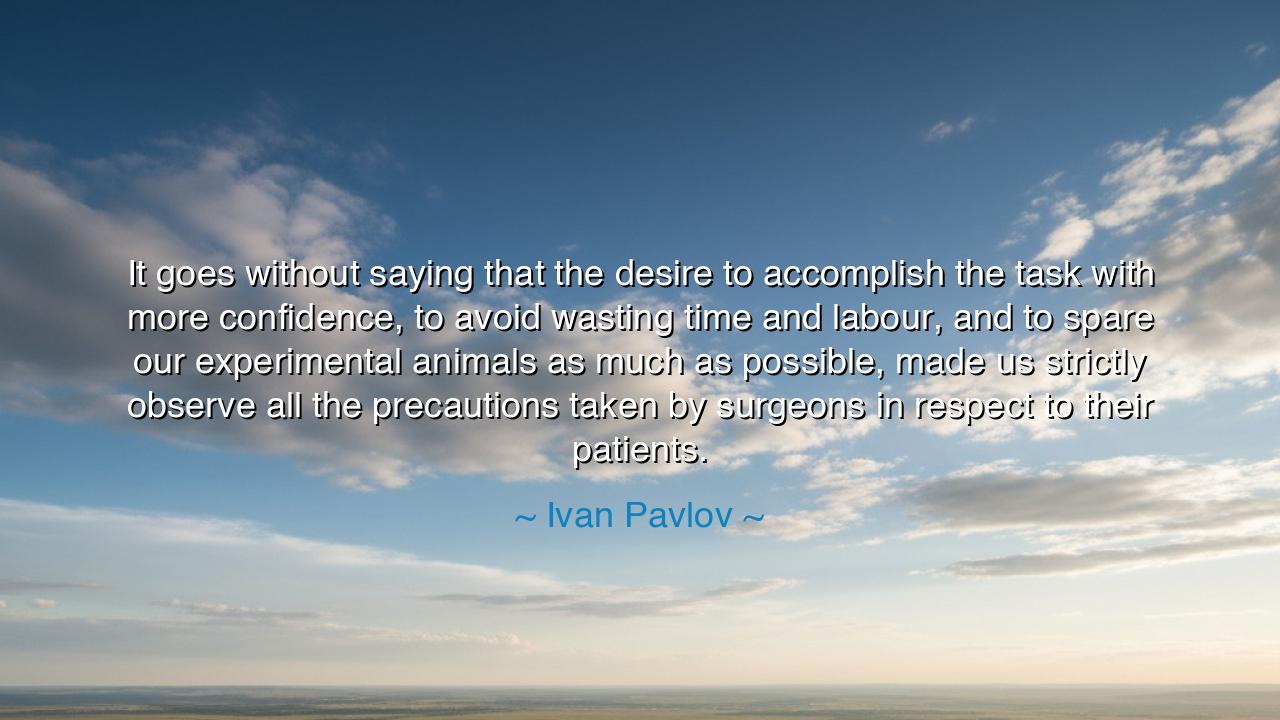
It goes without saying that the desire to accomplish the task
It goes without saying that the desire to accomplish the task with more confidence, to avoid wasting time and labour, and to spare our experimental animals as much as possible, made us strictly observe all the precautions taken by surgeons in respect to their patients.






In the words of Ivan Pavlov, the great Russian physiologist, there resounds not only the discipline of science but the moral echo of compassion: “It goes without saying that the desire to accomplish the task with more confidence, to avoid wasting time and labour, and to spare our experimental animals as much as possible, made us strictly observe all the precautions taken by surgeons in respect to their patients.” These are not the cold words of a scientist lost in calculation, but the mindful confession of one who understood that discovery, when stripped of conscience, becomes corruption. In this single reflection, Pavlov unites precision, humility, and humanity, reminding all seekers of knowledge that wisdom grows only where respect for life endures.
To grasp the meaning of these words, we must remember that Pavlov’s work stood at the frontier of human understanding. He was no mere experimenter; he was a pioneer of the unseen forces that govern both beast and man — the reflexes that link body and mind, instinct and will. Yet even as he studied the mysteries of the living, he remained ever aware of the sacredness of the life he touched. In an age when scientific ambition often sought to dominate nature, Pavlov’s voice was one of restraint — a call to responsibility. His words teach that true mastery lies not in domination, but in discipline guided by reverence.
The origin of this quote lies in Pavlov’s own laboratory in St. Petersburg, where he and his students performed experiments on animals to understand the physiology of digestion and behavior. These studies would later give birth to the concept of the “conditioned reflex,” a cornerstone of modern psychology. Yet amidst this pursuit of knowledge, Pavlov demanded an almost sacred surgical precision. He insisted that his team treat their animal subjects with the same care that a surgeon gives to a human patient. Why? Because he believed that the quest for truth must never sever itself from compassion. Knowledge gained through cruelty is knowledge poisoned by moral decay.
In these words, one can hear the echo of Hippocrates, the father of medicine, who centuries earlier taught, “First, do no harm.” Just as the physician must heal without violating life’s sanctity, so too must the scientist explore without desecrating what he studies. The ancient Greeks called this virtue sophrosyne — the harmony between reason and restraint. Pavlov, though living in a modern age of steel and microscopes, upheld this timeless principle. His laboratories were temples of observation, not slaughterhouses of ambition. Every incision, every experiment, every motion was to be done not only with accuracy, but with conscience.
History reminds us of those who ignored this balance and paid dearly for it. During the Enlightenment, some scientists sought progress without pity, experimenting recklessly upon the living in their hunger for fame. Their discoveries advanced knowledge, yes, but their names are spoken now with unease, their achievements shadowed by the suffering they caused. Pavlov’s voice stands in contrast — as that of a moral scientist, who understood that progress achieved without compassion is hollow. Like a surgeon’s steady hand, his philosophy teaches that control without care is destruction disguised as brilliance.
There is also, within this quote, a profound meditation on discipline itself. Pavlov’s call to “strictly observe all precautions” is not only a scientific directive — it is a spiritual one. To observe precaution is to practice mindfulness; to value time and labor is to respect one’s own efforts and the gift of life one studies. Whether in science, art, or daily living, his words remind us that precision is a form of respect — for others, for one’s craft, and for truth itself. The undisciplined mind, like the careless hand, wounds both the world and itself.
The lesson, then, is eternal: knowledge must walk hand in hand with morality. To learn is to wield power; to wield power rightly is to temper it with mercy. In our modern age, where the thirst for advancement races faster than the wisdom to guide it, Pavlov’s words return like a solemn warning. Let the scientist remember the sanctity of the living. Let the doctor remember the dignity of the patient. Let every maker, thinker, and seeker remember that progress without compassion is but another name for ruin.
So, my children of the mind, take this teaching to heart. Whatever your craft — whether you build machines, heal the sick, or shape ideas — let your desire for mastery be bound always by respect for life. Observe your work as Pavlov did: with rigor, with care, and with the humility to remember that every discovery touches something sacred. For in the end, the greatest experiment of all is not in the laboratory, but in the human heart — to see whether wisdom and kindness can coexist in the pursuit of truth.






AAdministratorAdministrator
Welcome, honored guests. Please leave a comment, we will respond soon